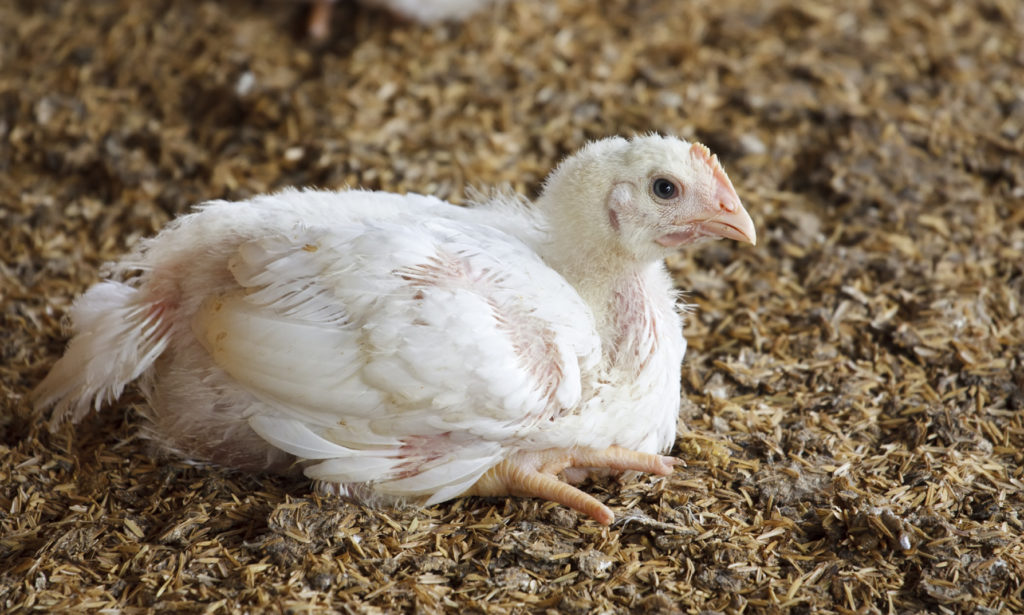PvdD demande à Bruxelles une interdiction totale du poison fipronil
La Commission européenne doit interdire complètement le poison fipronil, trouvé en masse dans les œufs, de l’agriculture en Europe. Anja Hazekamp, parlementaire européenne au nom du Parti pour les Animaux, en a fait une demande à Bruxelles lors d’un débat sur la crise du fipronil.
Dans l’UE le fipronil ne peut pas être utilisé chez les animaux de la chaîne alimentaire, mais il est juridiquement disponible. Le poison est toujours autorisé à être utilisé dans les cultures arables. « Le fipronil est juste à vendre en Europe et peut facilement être mal utilisé pour de mauvaises intentions, ce qui entraîne des œufs empoisonnés dans le supermarché et dans notre assiette. Une interdiction totale est plus sûre pour la santé humaine et animale et mieux pour notre environnement » dit Hazekamp.

Poule de l’industrie avicole
Les règles de l’UE ont été violées grossièrement
Le Parti pour les Animaux souligne que l’on a été irresponsable dans le domaine du bien-être de centaines de milliers de poules pondeuses traitées de fipronil qui sont tuées le mois dernier aux Pays-Bas. Hazekamp a déclaré que les abattages étaient en violation des règles de l’UE pour la protection des animaux et donc illégaux. « Ces poules n’étaient pas malades et elles n’ont pas mis en danger la santé publique. On a causé des douleurs, des souffrances et des blessures inutiles aux poules, ce qui est contraire à la législation européenne. Je veux savoir comment la Commission européenne empêchera ces pratiques à l’avenir, » dit Hazekamp.
Dans la crise du fipronil, le Parti pour les Animaux voit la énième épreuve que les règles européennes concernant le bien-être des animaux et la sécurité alimentaire ne sont pas respectées et que le contrôle est souvent absent. « Il a été démontré à nouveau que notre système agricole est intenable, mais je m’attends à ce que la Commission européenne ait besoin d’encore beaucoup de scandales pour obtenir la même idée », a déclaré Anja Hazekamp.
Histoire
En juillet le poison fipronil a été découvert dans les œufs aux Pays-Bas et en Belgique et après il s’est révélé que les œufs dans d’autres pays européens ont aussi été contaminés. On a également constaté que quelques veaux ont reçu un poison pareil, nommé amitraz. Beaucoup d’œufs et de produits à la base d’œufs ont été prélevés des rayons aux supermarchés, car ils constituent une menace pour la santé publique. Suite à ces scandales le Parti pour les Animaux a rappelé l’Assemblée nationale néerlandaise des vacances parlementaires pour un débat. Dorénavant le gouvernement néerlandais a ordonné une enquête sur le scandale des œufs.
During a debate on the fipronil scandal, Party for the Animals MEP Anja Hazekamp has called on the European Commission in Brussels to ban the insecticide fipronil, found in vast quantities of eggs, completely from European agriculture.
In the EU, fipronil cannot be used on animals destined for human consumption, but it is legally available and authorised for use in arable farming. “Fipronil is freely available in Europe, and can therefore easily be used for inappropriate ends, leading to contaminated eggs ending up on supermarket shelves and our plates. A total ban will be safer for human and animal health and the environment,” said Hazekamp.

A chicken in the poultry industry
Crude violation of EU rules
In addition, the Party for the Animals points out that there has been insufficient regard for the welfare of the hundreds of thousands of laying hens treated with fipronil, which were slaughtered in the Netherlands last month. According to Hazekamp, these killings were in violation of EU rules on the protection of animals, and therefore illegal. “These chickens were neither ill nor a threat to public health. Pain, suffering and injury were unnecessarily inflicted on chickens, which is at odds with European legislation. I would like to know how the European Commission is planning to avoid such practices in the future.”
To the Party for the Animals, the fipronil scandal is further proof that European rules for animal welfare and food safety are not complied with, and that there is hardly any monitoring. According to Hazekamp, the scandal has once again demonstrated the unsustainability of the Dutch agricultural system, but she expects the European Commission to “need many more scandals before coming to the same conclusion”.
Background
In July of this year, eggs tested in Belgium and the Netherlands were found to contain levels of the toxic insecticide fipronil. Soon after, eggs in other European countries also turned out to be contaminated. In addition, it came to light that some calves had been in contact with a similar pesticide, called amitraz. Many eggs and egg products were removed from supermarket shelves because they presented a public health risk. Following these scandals, the Party for the Animals called for the Dutch Lower House to return early from Summer recess for a debate on the subject. The Dutch government has launched an enquiry into the egg scandal.